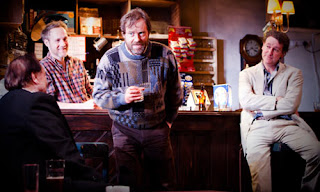'The Weir' review or 'An Irish man, an Irish man and an Irish man walked into a bar...'
'The
Weir', Conor McPherson
Donmar
Warehouse, Friday 26th
April 2013
Written
for Culture Wars
An
Irish man, an Irish man and an Irish man walked into an (Irish) bar
and told some ghost stories. A woman joined them and shared one hell
of a horror story of her own. They all got the shivers and they all
laughed. In turn, each of the Irish men whispered, 'I am lonely'.
These frightened confessions were by far the scariest stories of the
night.
It
might not take long to summarise Conor McPherson's play but this is
still a beast of a play. What gentle, funny, moving theatre! The
dialogue is exquisite. It hums, swells, soars, crackles and whispers.
The characters are ordinary – yet somehow dazzling in their
ordinariness. And the structure is sublime. McPherson writes plays
that feel simple but which are tied together with such skill, the
themes as delicate as silk, lightly binding everything together but
never squeezing too tight.
The
characters develop as deftly as the atmosphere, which is initially
light-hearted and bolshy but ultimately quiet, honest and raw. Barman
Brendan (Peter McDonald) and Jack (Brian Cox) kick things off with
deceptive ease. They play out their tired yet entertaining routine,
deliberating over drinks they know they will have, gossiping about
locals they rarely see and dismissing a life of domestic bliss they
will never know.
Local
handyman Jim (Ardal O'Hanlon) joins them and he too is living a life
of blank pages, holed away with his ill mother who point blank
refuses to die. Their easy conversation – which still has thorns
thanks to Jack's spiky outbursts – is ruptured by the arrival of
local businessman, Finbar (Risteard Cooper). He has brought along
Valerie (Dervla Kirwan), new to the town and its idiosyncrasies. The
pub morphs with Valerie's arrival. The space seems to contract as the
men jostle about for position, unsure of where to sit or stand.
And
then the horror stories begin. Perhaps there could've been a touch
more malice to them; director Josie Rourke teases out some bruising
banter but the stories and the storytellers never truly threaten. We
feel a touch too safe in their company and there's a whiff of the boy
scouts to the ghost stories they tell. For all the shocks and
suspense there is comfort in the whole process - not unlike the
flickering camp-fire that warms us, as we spin our spooky tales.
Despite
the slightly soft-edge to these ghost-stories, they still fill the
space beautifully. The whole theatre shrinks and we are drawn closer
and closer, drinking and laughing and gasping with the characters
on-stage. Dervla Kirwan is an intriguing, baffling presence as
newcomer Valerie. She exists on a different emotional plain from
everyone else. She examines the men with such a sad intensity,
looking for answers in their faces. When the time comes for Valerie
to tell her own, deeply personal horror story, it is as she has
absorbed all the men's fear and is releasing it in one almighty
exhalation.
It
is quite something to see the men's appearance change with Valerie's
haunting confession. They transform from bragging boys to haggard
men, their faces etched with sadness and shame. Brian Cox's
transformation is particularly striking. His Jack is initially pumped
full of bravado; he moves and speaks with the type of insistent
swagger, which stinks of self-doubt. But after Valerie's revelation,
Jack drops his performance. His final speech, in which he recalls
losing the love of his life, cuts deep. Simple phrases hang heavy
with meaning; 'I just...left her out.' A lost love, McPherson
whispers, can make ghosts of us all.



Comments
Post a Comment